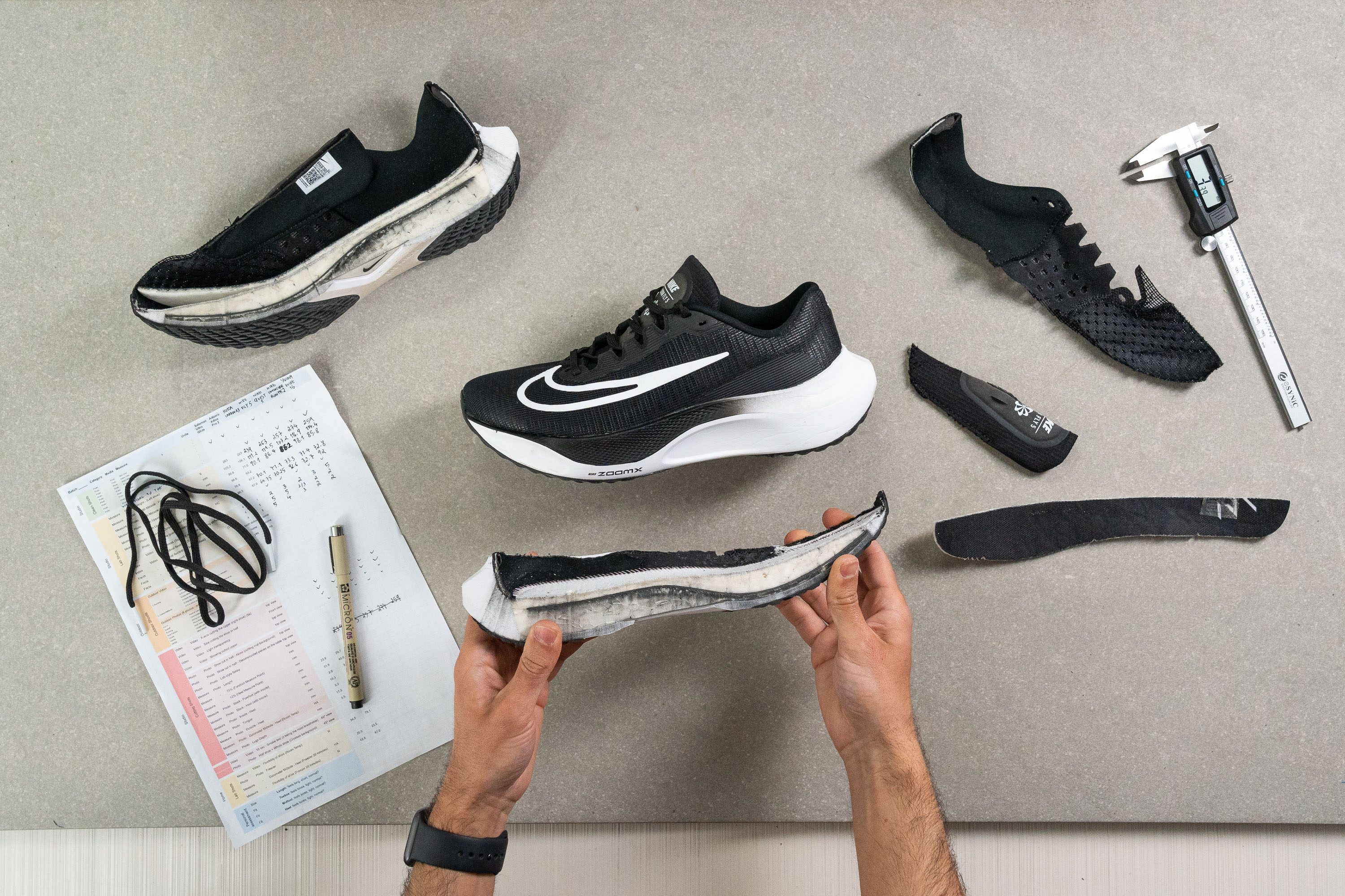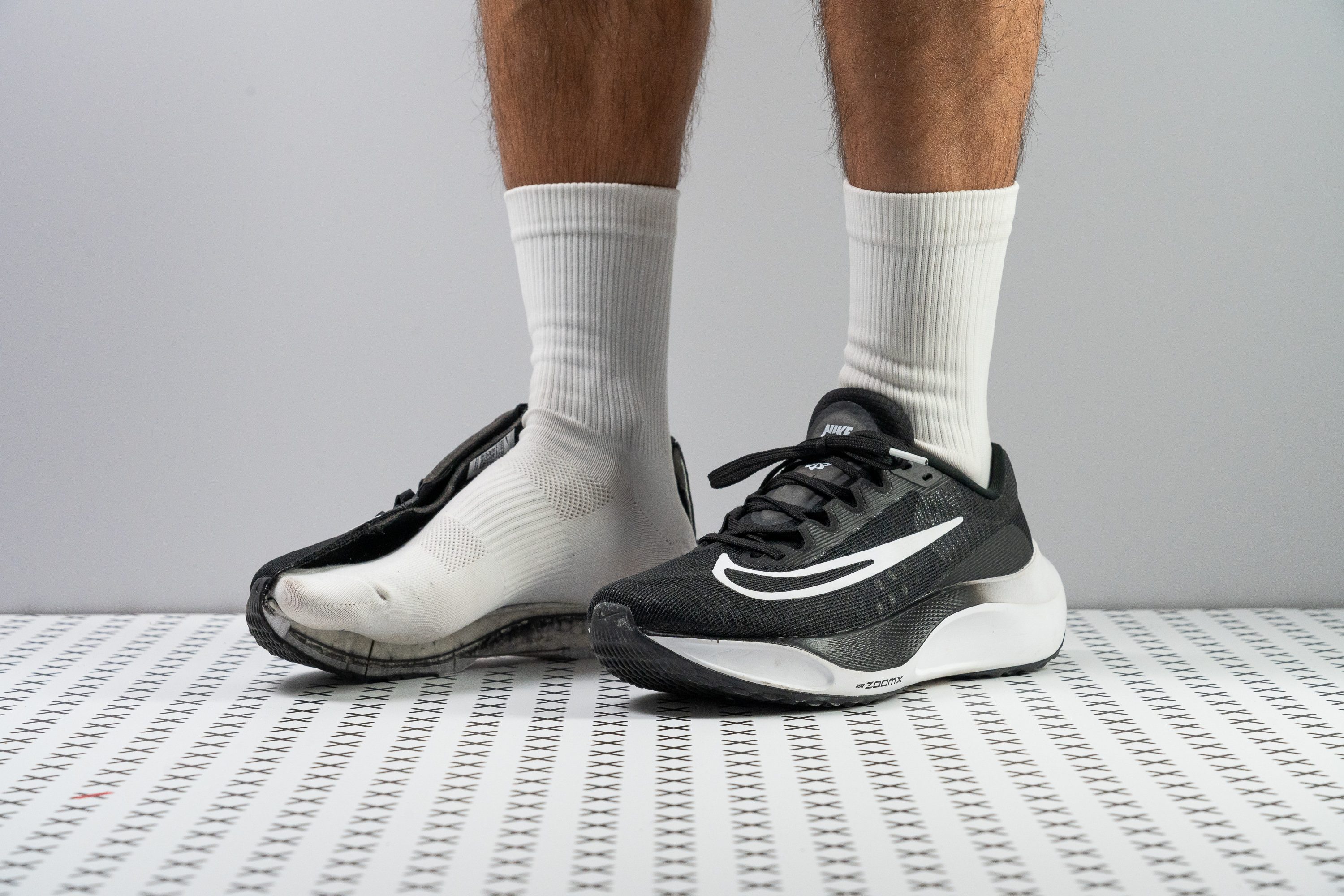Our verdict
- Top pick in best Nike ZoomX running shoes (2024)
Pros
- Planted strides when cornering
- Protects foot from impact
- Smooth, seamless ride
- Upper oozes with comfort
- Fit is A-OK!
- Lockdown is awesome
- Tongue stays in place
- Clingy even on wet areas
- Quite the bruiser
Cons
- Chunky and clunky
- Slower than other Zoom Flies
- Stiff ride
Audience verdict
- Top 28% most popular running shoes
Comparison
The most similar running shoes compared
+ + Add a shoe | |||||
|---|---|---|---|---|---|
| Audience score | 80 Good! | 89 Great! | 92 Superb! | 85 Good! | |
| Price | £160 | £150 | £165 | £230 | |
| Pace | Daily runningTempo | Tempo | CompetitionTempo | Tempo | |
| Shock absorption | - | High | High | High | |
| Energy return | - | Moderate | Moderate | High | |
| Traction | - | High | Moderate | High | |
| Arch support | Neutral | Neutral | Neutral | Neutral | |
| Weight lab Weight brand | 9.8 oz / 279g 10.1 oz / 286g | 9.5 oz / 268g 9.5 oz / 269g | 8.7 oz / 248g 8.6 oz / 244g | 9.8 oz / 278g 9.8 oz / 278g | |
| Lightweight | ✗ | ✗ | ✓ | ✗ | |
| Drop lab Drop brand | 7.5 mm 8.0 mm | 10.1 mm 10.0 mm | 9.6 mm 8.0 mm | 7.3 mm 6.0 mm | |
| Strike pattern | Mid/forefoot | Heel | HeelMid/forefoot | Mid/forefoot | |
| Size | True to size | Slightly small | True to size | True to size | |
| Midsole softness | Soft | Soft | Soft | Soft | |
| Difference in midsole softness in cold | Normal | Normal | Small | Normal | |
| Toebox durability | - | Decent | Good | Bad | |
| Heel padding durability | - | Decent | Good | Good | |
| Outsole durability | - | Decent | Good | Decent | |
| Breathability | Warm | Moderate | Moderate | Moderate | |
| Width / fit | Narrow | Narrow | Narrow | Medium | |
| Toebox width | Narrow | Narrow | Medium | Medium | |
| Stiffness | Stiff | Stiff | Stiff | Stiff | |
| Torsional rigidity | Stiff | Stiff | Stiff | Stiff | |
| Heel counter stiffness | Moderate | Flexible | Stiff | Moderate | |
| Plate | Carbon plate | Carbon plate | Carbon plate | Carbon plate | |
| Rocker | ✓ | ✗ | ✓ | ✓ | |
| Heel lab Heel brand | 36.9 mm 41.0 mm | 37.4 mm 39.0 mm | 39.7 mm 40.0 mm | 36.8 mm 41.0 mm | |
| Forefoot lab Forefoot brand | 29.4 mm 33.0 mm | 27.3 mm 29.0 mm | 30.1 mm 32.0 mm | 29.5 mm 35.0 mm | |
| Widths available | Normal | NormalWide | Normal | NormalWide | |
| Orthotic friendly | ✓ | ✓ | ✓ | ✓ | |
| Season | All seasons | All seasons | All seasons | All seasons | |
| Removable insole | ✓ | ✓ | ✓ | ✓ | |
| Ranking | #568 Bottom 13% | #114 Top 31% | #15 Top 5% | #208 Bottom 43% | |
| Popularity | #180 Top 28% | #60 Top 17% | #26 Top 8% | #40 Top 11% |
Who should buy
We think that this Nike shoe is most suitable for steady efforts and medium to long-distance runs. This is all thanks to its smooth and rockered ride.
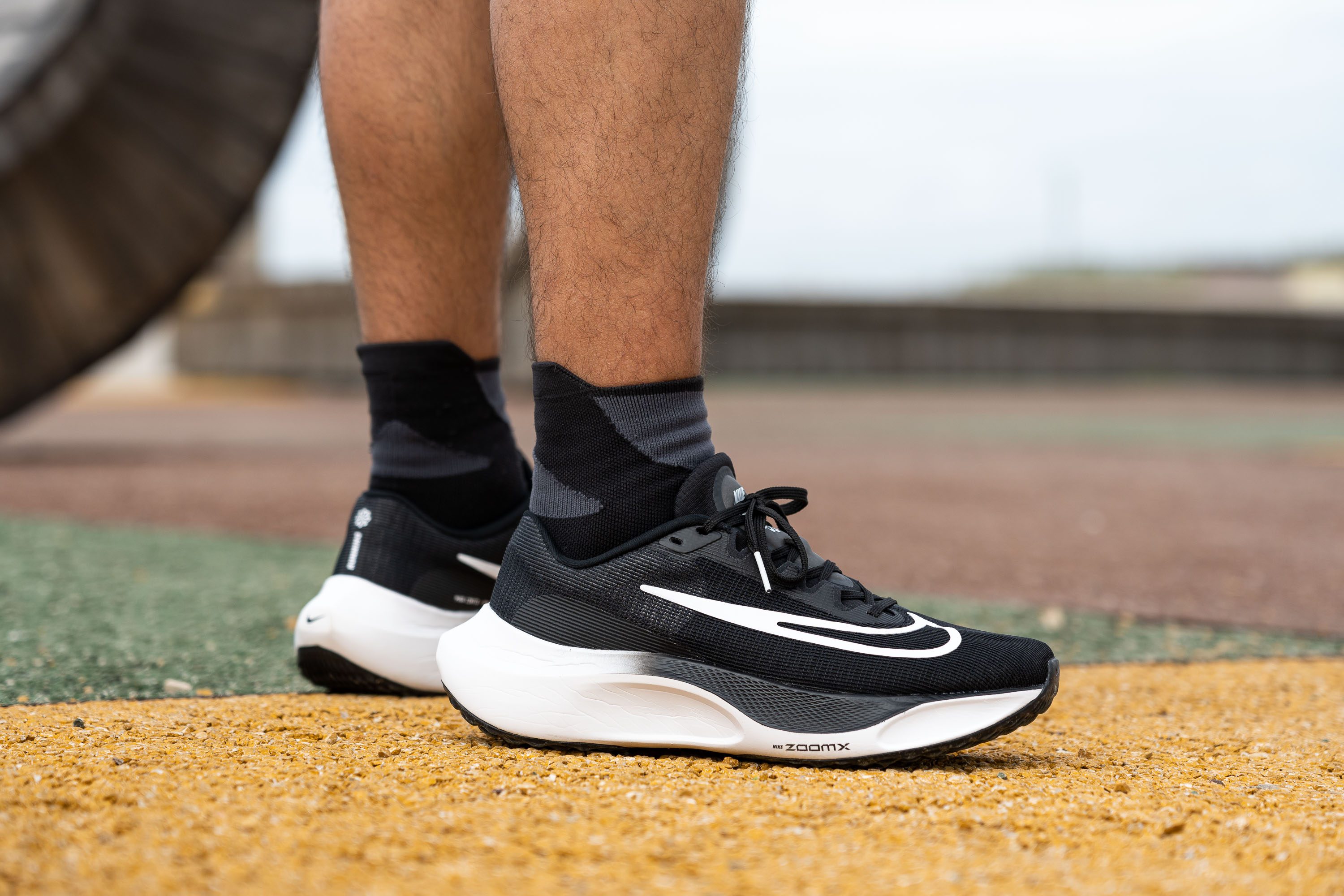
Who should NOT buy
The Zoom Fly 5 also has its downsides, and one thing that sticks out is its slightly heavier weight. On top of this, it's not the tempo trainer Nike says it is. This said you're better off with the newer Nike Streakfly.
If you want comfort and speed combined, the Nike Pegasus Turbo might suit you better than the Zoom Fly 5.
Cushioning
Heel stack
Here is the main reason why we prefer the Zoom Fly 5 for relaxed and easy days - 37 mm of stack in the heel!
Not only is it 3.5 mm taller than average, but we also found it among the best vibration-dampening trainers on the market!
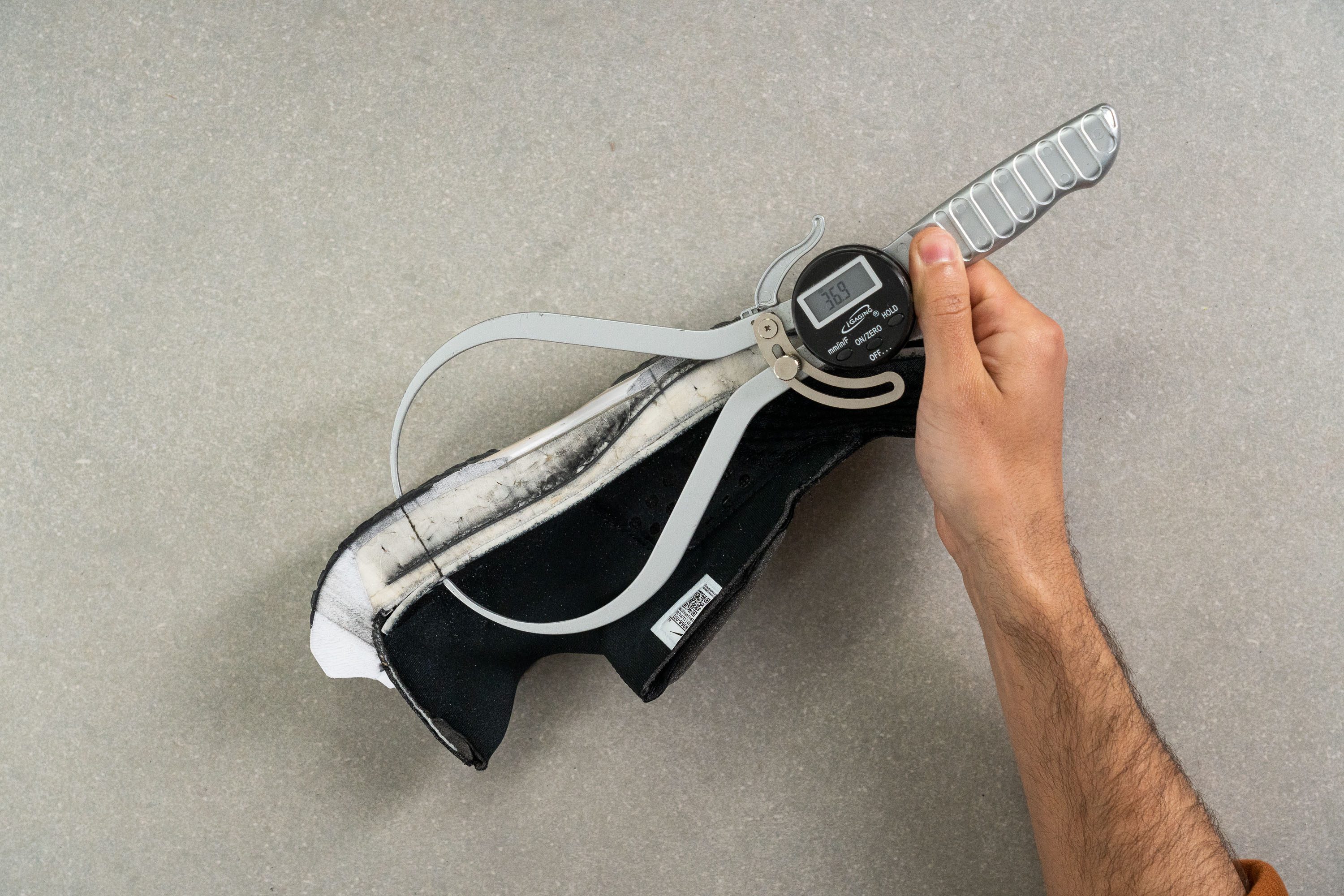
| Zoom Fly 5 | 36.9 mm |
| Average | 34.7 mm |
Forefoot stack
The Zoom Fly 5 is a high-stacked shoe in every way! Even in the forefoot, our calliper showed 29.4 mm which is 5 mm taller than average.
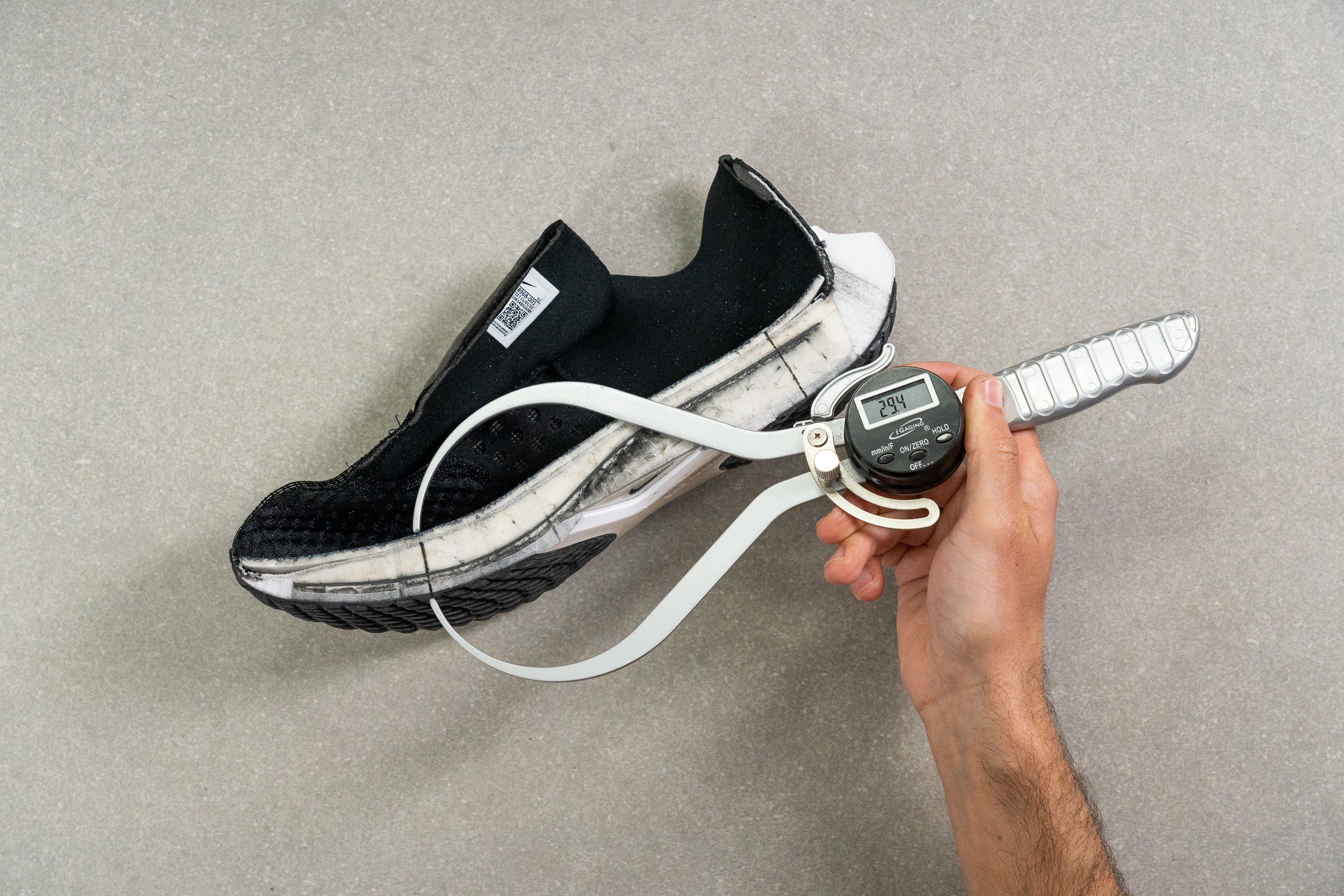
| Zoom Fly 5 | 29.4 mm |
| Average | 26.1 mm |
Drop
The difference in stack heights gives us a heel-to-toe drop of 7.5 mm. That's a middle-ground drop that will perfectly work for the majority of runners.
| Zoom Fly 5 | 7.5 mm |
| Average | 8.6 mm |
Midsole softness
After years of having a Nike React foam in this tempo shoe series, Nike finally introduced its cutting-edge ZoomX foam in the Zoom Fly 5! However, it was rather disappointing because the ZoomX doesn't go full length.
How does this translate on the run? Well, it doesn't feel very soft or spongy, and the ride is rather firm. That's a real bummer because the ZoomX portion of the midsole appears to be SO plush in our durometer measurement. At 11.0 HA, this foam is extremely soft (79% softer than average).
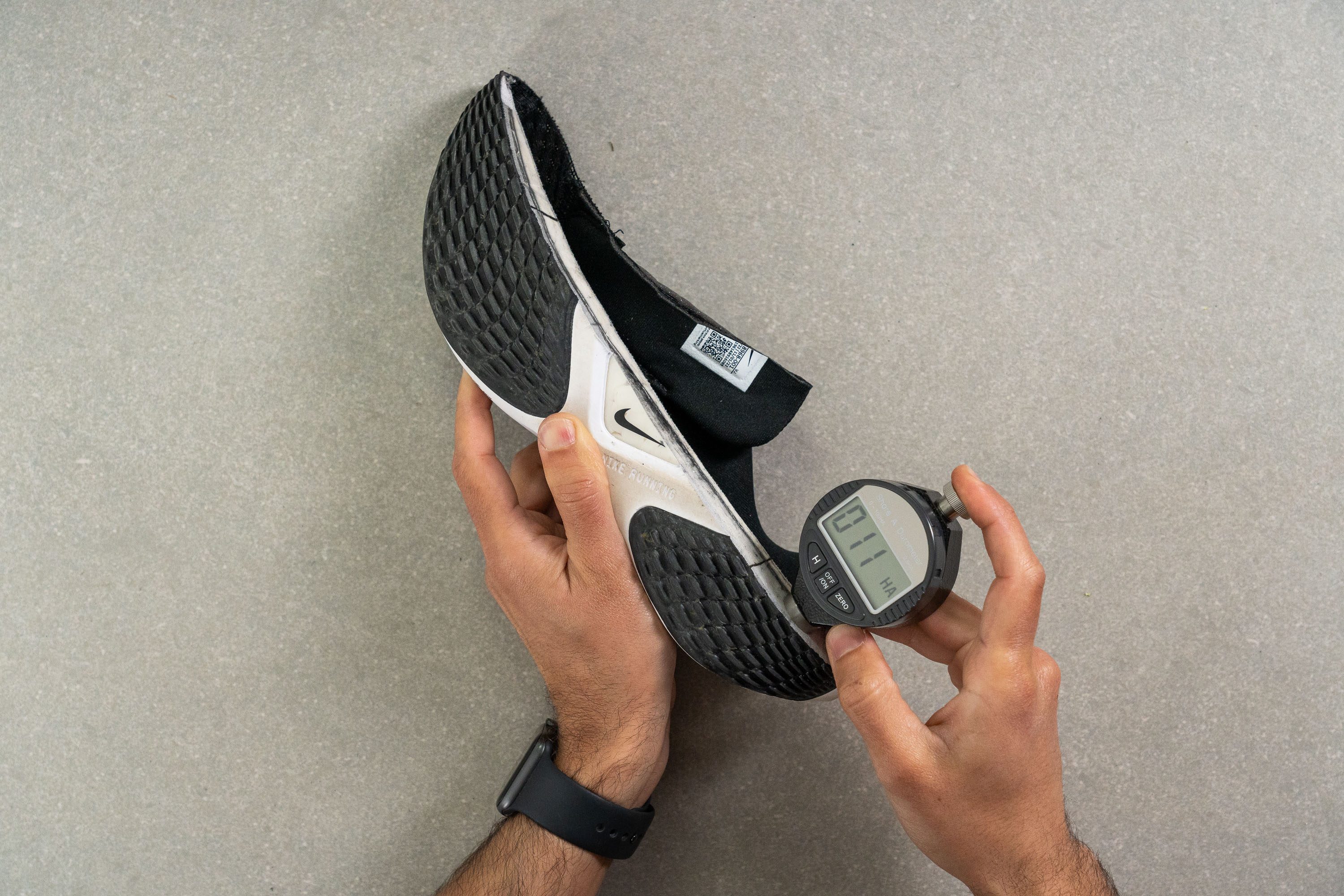
Most likely, this happens for three reasons:
- firstly, as you can see in the picture below, in the forefoot the plate gets much closer to the outsole, changing the feel in this area;
- secondly, the recycled ZoomX foam used in this shoe is firmer than the regular ZoomX;
- lastly, there's also a thinner layer of EVA foam (SR-02 type) just above the outsole, which is much firmer than the ZoomX.
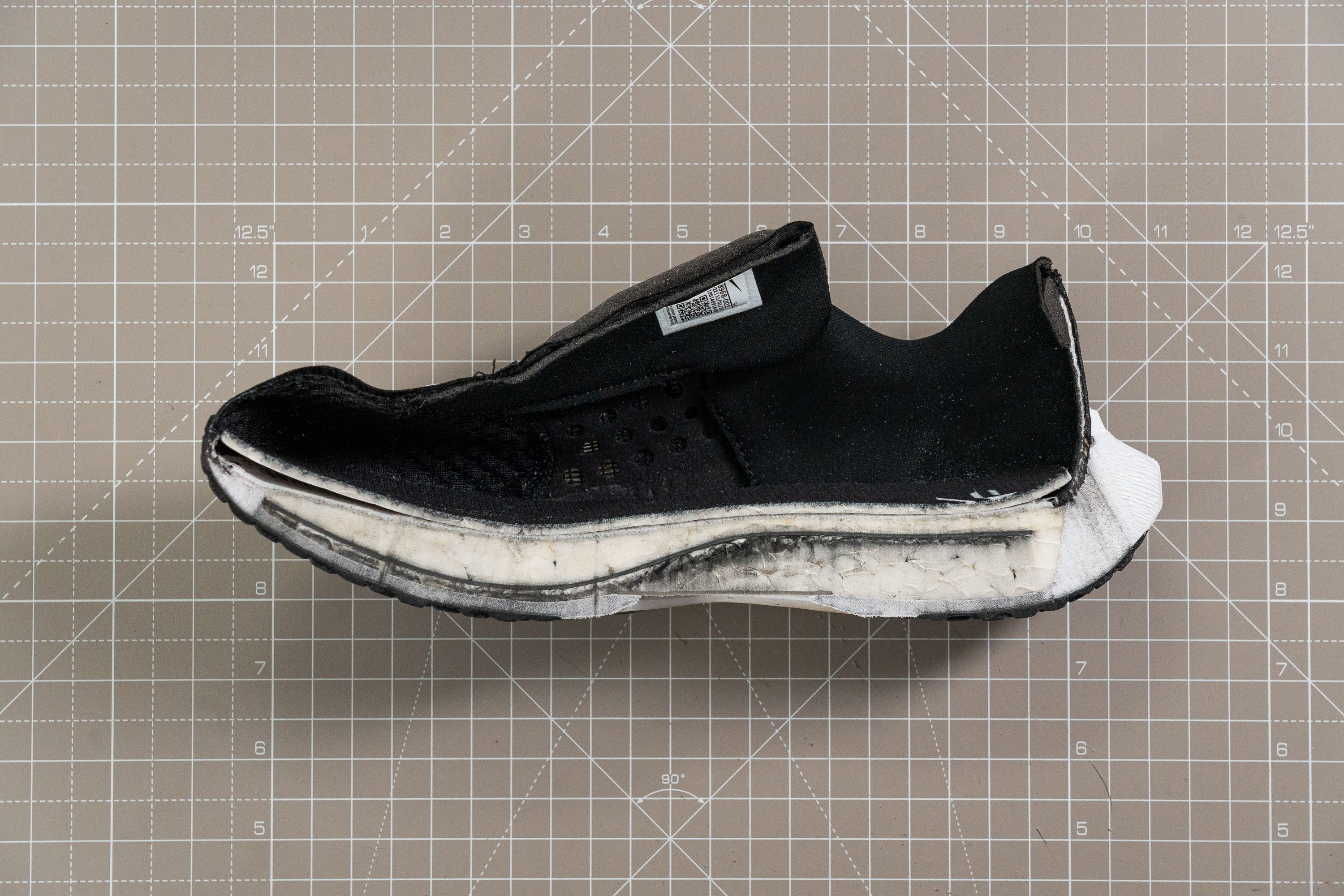
| Zoom Fly 5 | 11.0 HA |
| Average | 20.4 HA |
Ride
We have come to the conclusion that the Nike Zoom Fly line is no longer a tempo running shoe. With its maxed-out cushion, it feels pretty heavy and cruisy. And when it comes to energy return, the shoe is not giving much back!
Even the rockered geometry doesn't do much to make the shoe more propulsive. That's a real shame for the Zoom Fly collection.
So where does it fit better? We believe that it now belongs to the daily trainers for long distances.
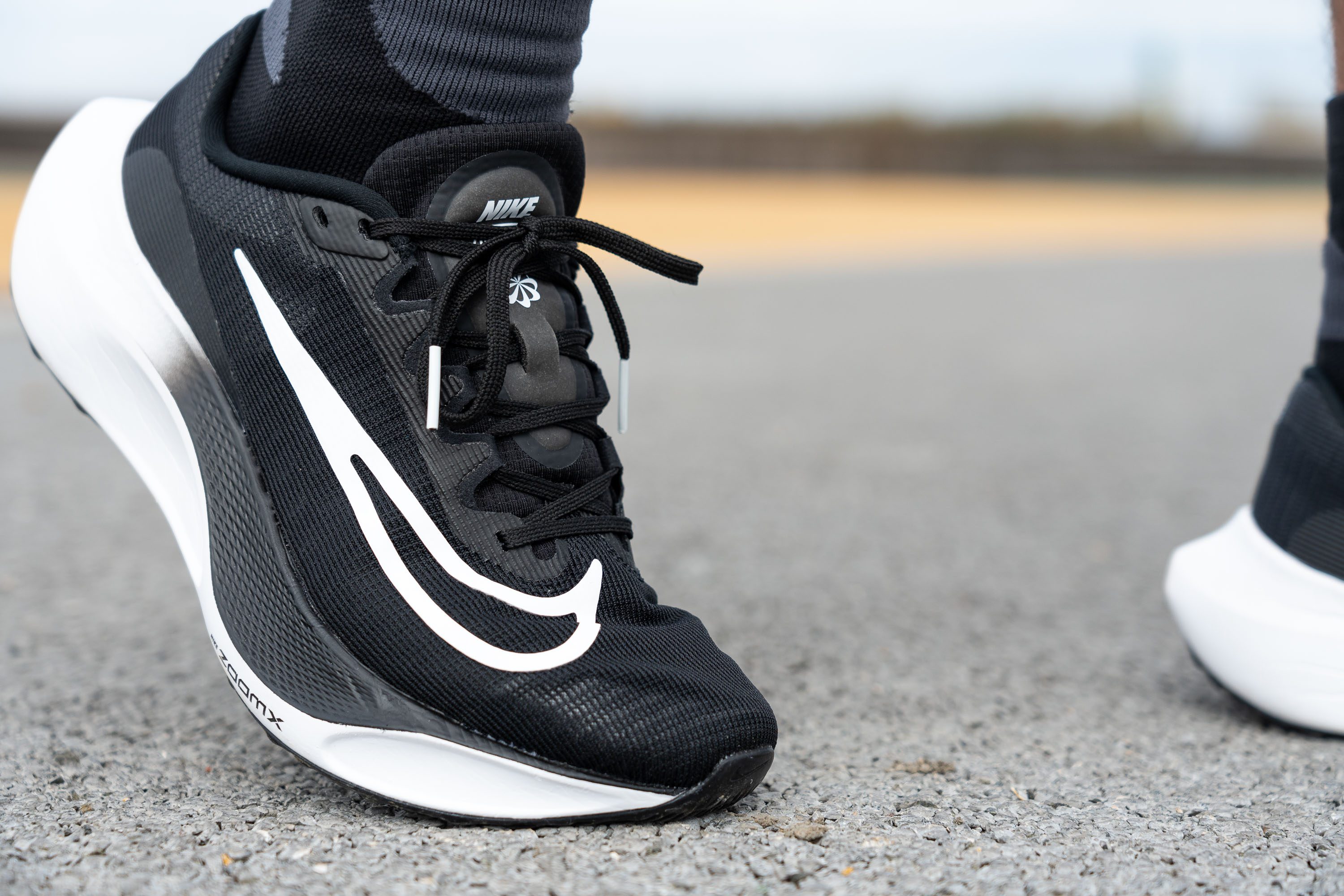
Size and fit
The Fly 5 uses a no-nonsense upper that just works! A real workhorse type of upper. We found it to be very comfortable and form-fitting. Once we laced it up, a solid foothold was guaranteed.
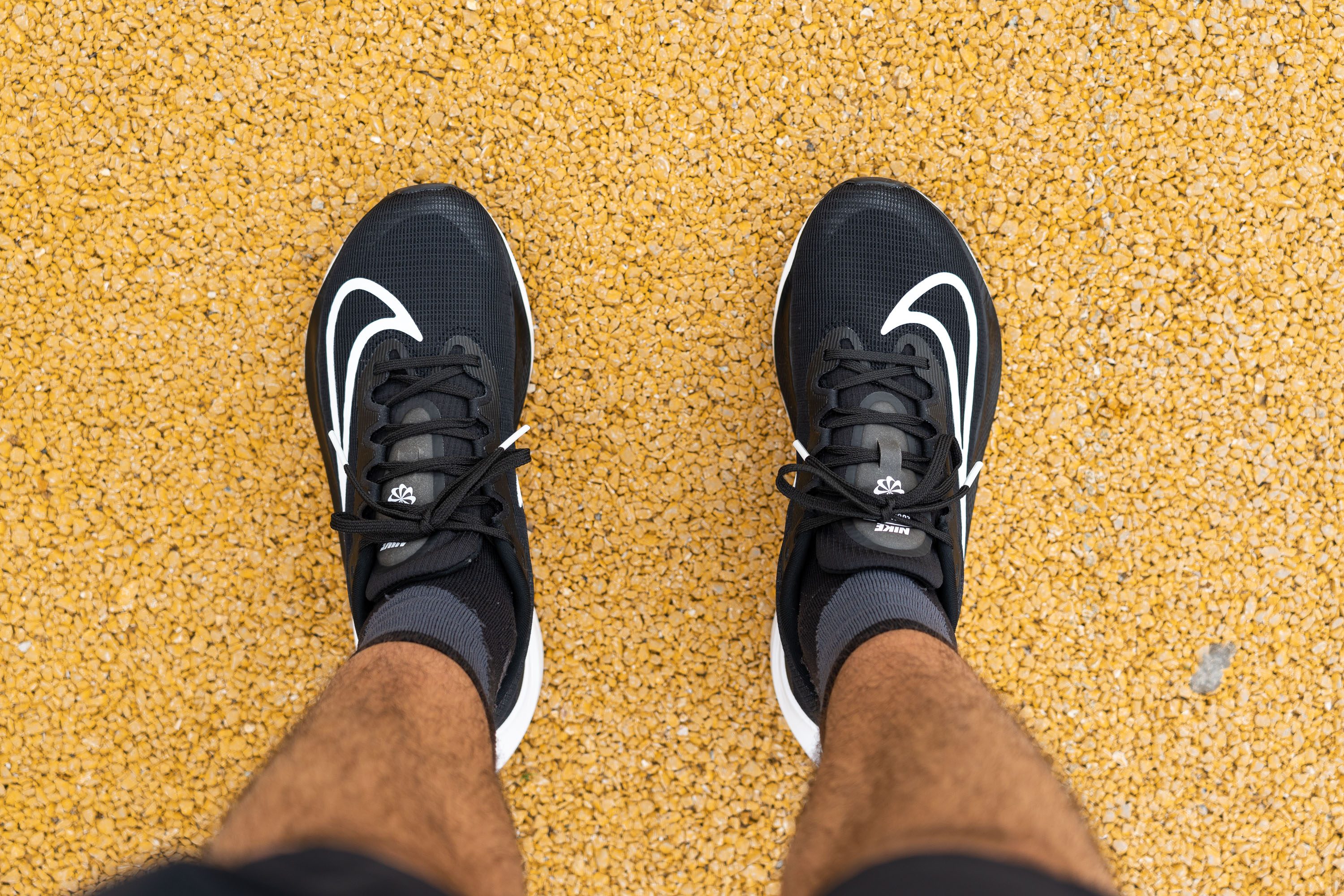
Size
Nike Zoom Fly 5 fits true to size (129 votes).
Toebox width - widest part
We measured the shoe at the widest part and the result was 95 mm, which is just a little bit narrower than the average.
What's more, the toebox narrows towards the toes more than other running shoes' toeboxes we measured. Overall, this is in line with Nike's trend to have narrower toe boxes in general.

This test follows an older methodology, which is why you don't see recently tested shoes in the chart. Results from different methodologies can not be compared.
| Zoom Fly 5 | 95.0 mm |
| Average | 98.5 mm |
Toebox width - big toe
Also, as often happens with Nike, the shoe's toebox has a notably tapered shape.
Our calipers returned a really narrow width measurement around the big toe - only 71.1 mm.
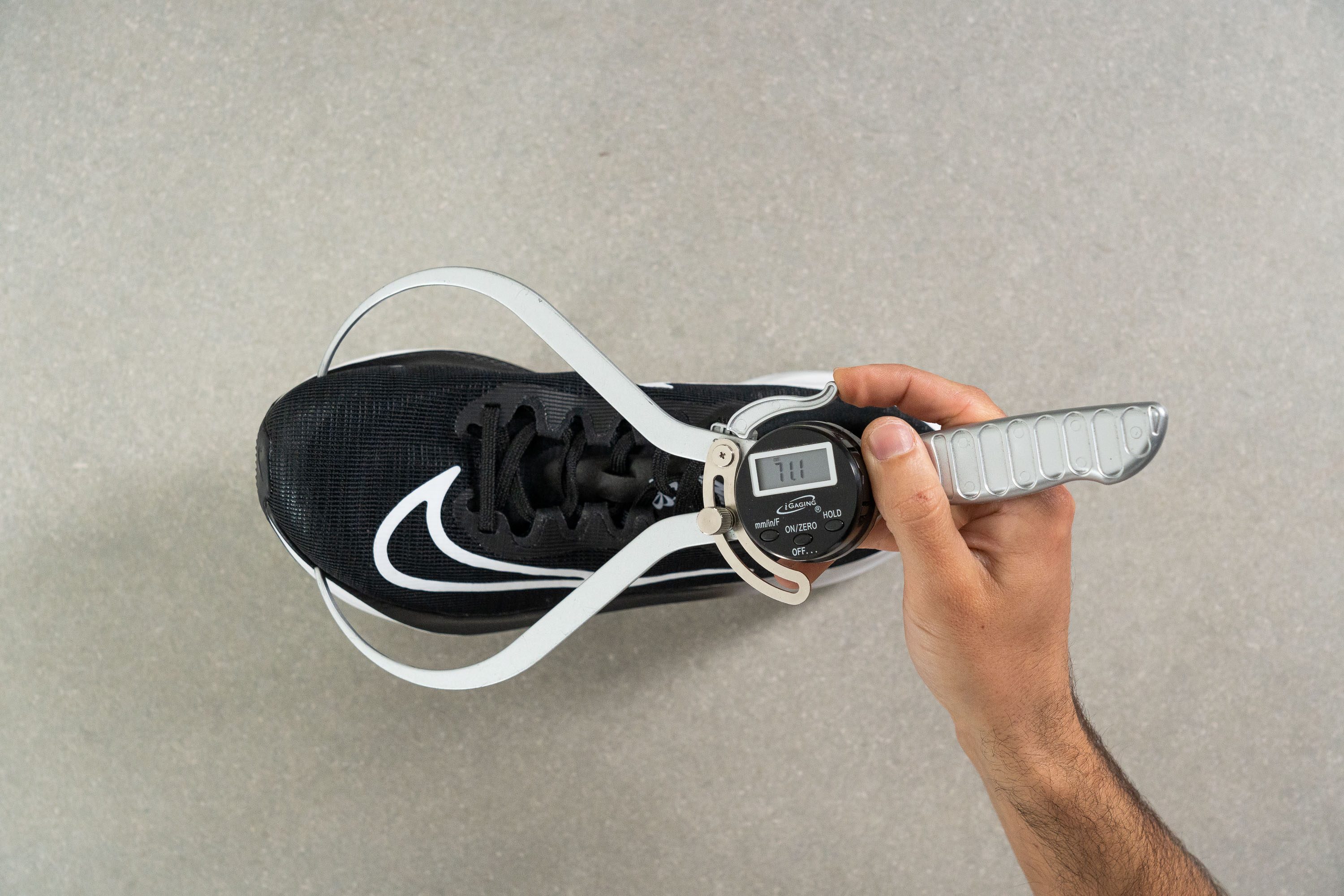
This test follows an older methodology, which is why you don't see recently tested shoes in the chart. Results from different methodologies can not be compared.
| Zoom Fly 5 | 71.1 mm |
| Average | 78.4 mm |
Flexibility / Stiffness
Most plated running shoes are stiff, and the Zoom Fly 5 is no exception.
Measuring how much force it takes to bend the shoe to a 90-degree angle (71.0N), we found that it is a whopping 60% stiffer than the average road running shoe!
This test follows an older methodology, which is why you don't see recently tested shoes in the chart. Results from different methodologies can not be compared.
| Zoom Fly 5 | 71.0N |
| Average | 28.1N |
Stiffness in cold (%)
The good news is that in cold temperatures it doesn't get much stiffer, only by 5.1%. On average, running shoes are 44% less flexible.
| Zoom Fly 5 | 5% |
| Average | 33% |
Weight
The weight of the Zoom Fly 5's weight is a downer—quite literally. For what is supposed to be a fast shoe, this trainer is very heavy.
The rubber-covered outsole plus the very padded upper are not helping to shave off the weight!
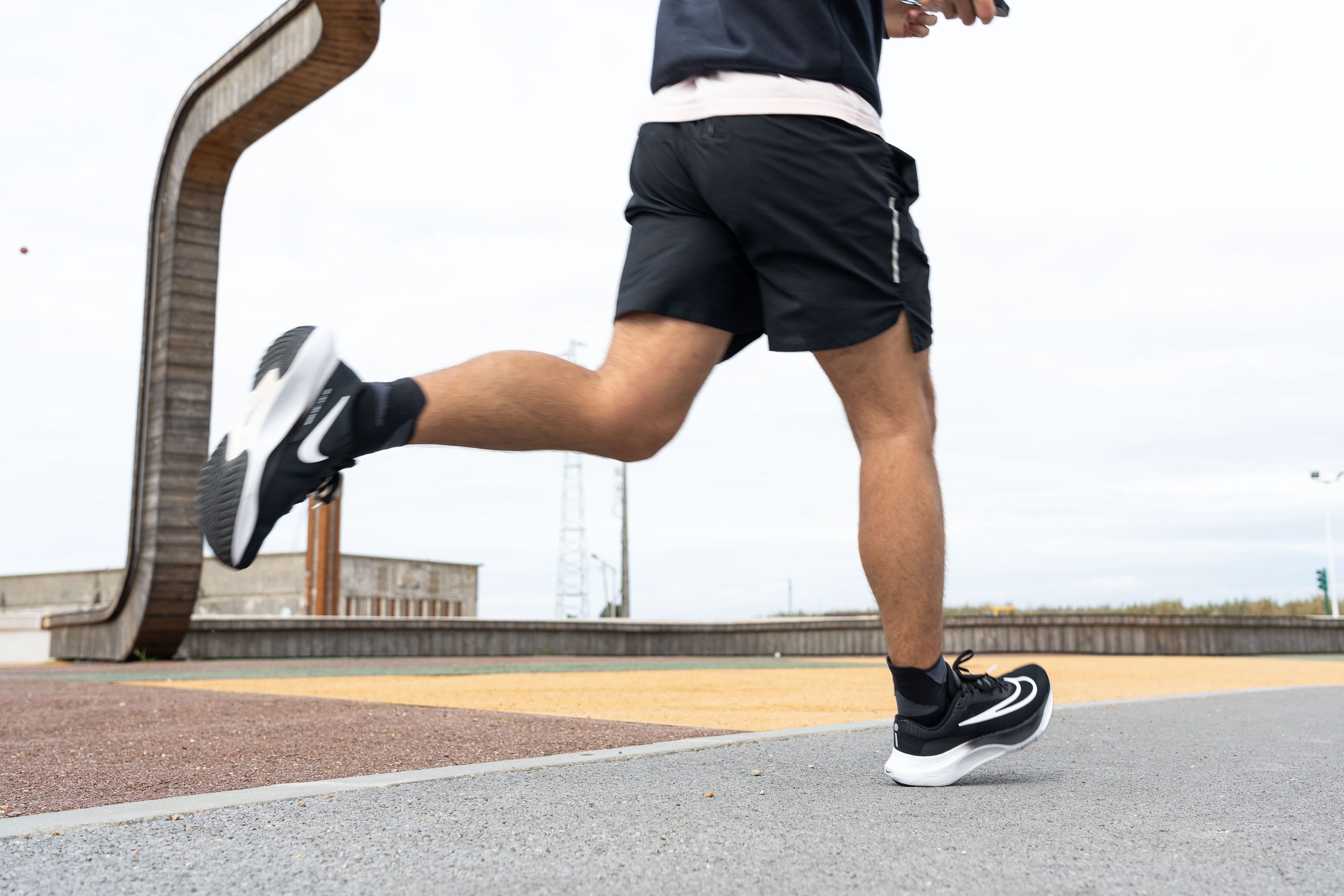
Perhaps you may find the Saucony Endorphin Speed 3 or the ASICS Novablast 3 better options for tempo runs. They come belong to the same type as the Zoom Fly but are much much lighter!
| Zoom Fly 5 | 9.8 oz (279g) |
| Average | 9.3 oz (264g) |
Breathability
It was very unfortunate to find out about the shoe’s lack of ventilation. In our breathability test, it scored only 2 out of 5 (5 is the most breathable). It is clearly not the airiest shoe.
To carry out this test, we use a smoke-pumping machine and cover up the shoe mouth entirely. This way, the smoke is only able to escape through the upper of the shoe.
As a further check on breathability, we also test how transparent the upper material is. As you can see in the video above, the Nike Fly 5's upper material lets light through, confirming that the shoe, while not the best, has some degree of breathability.
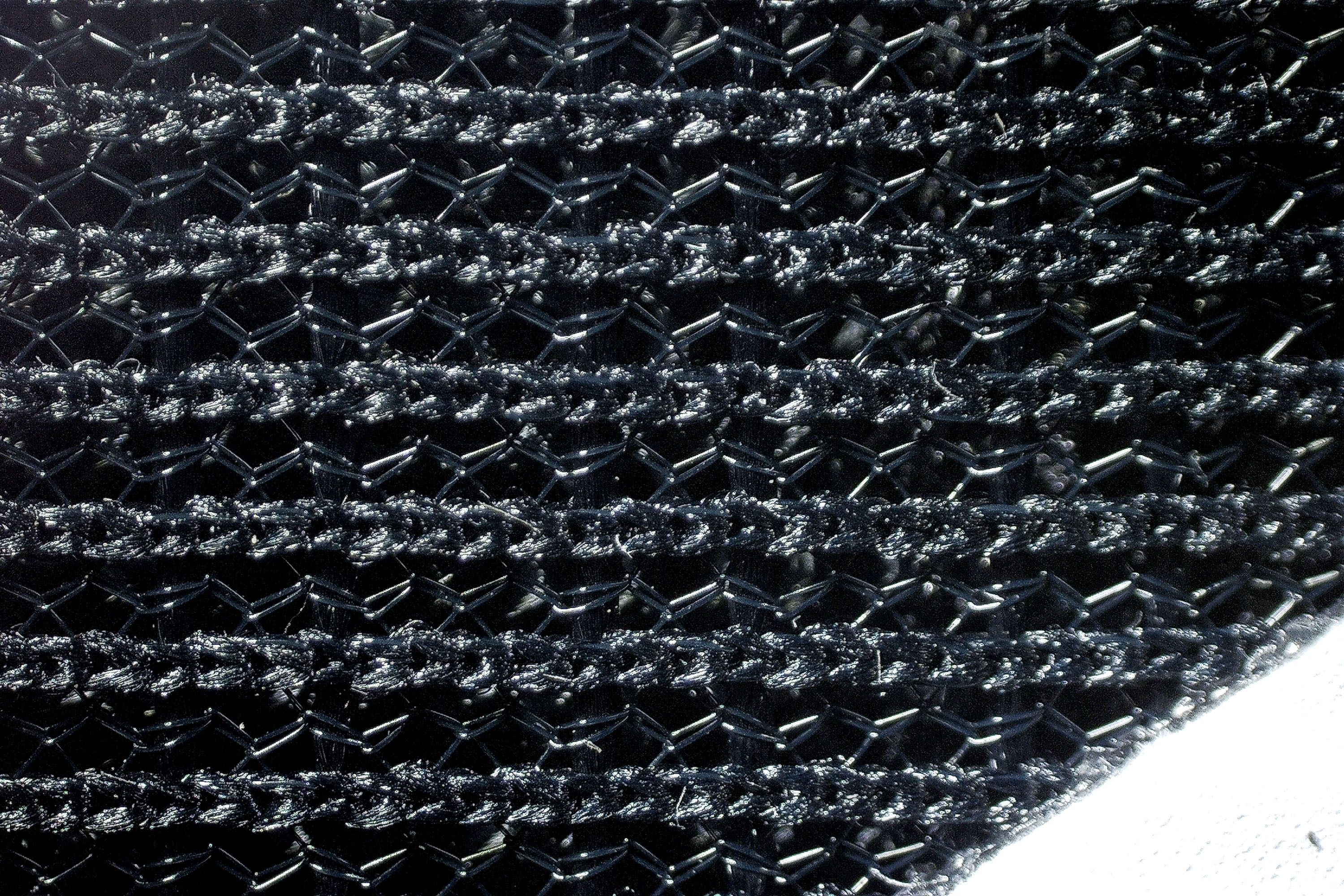
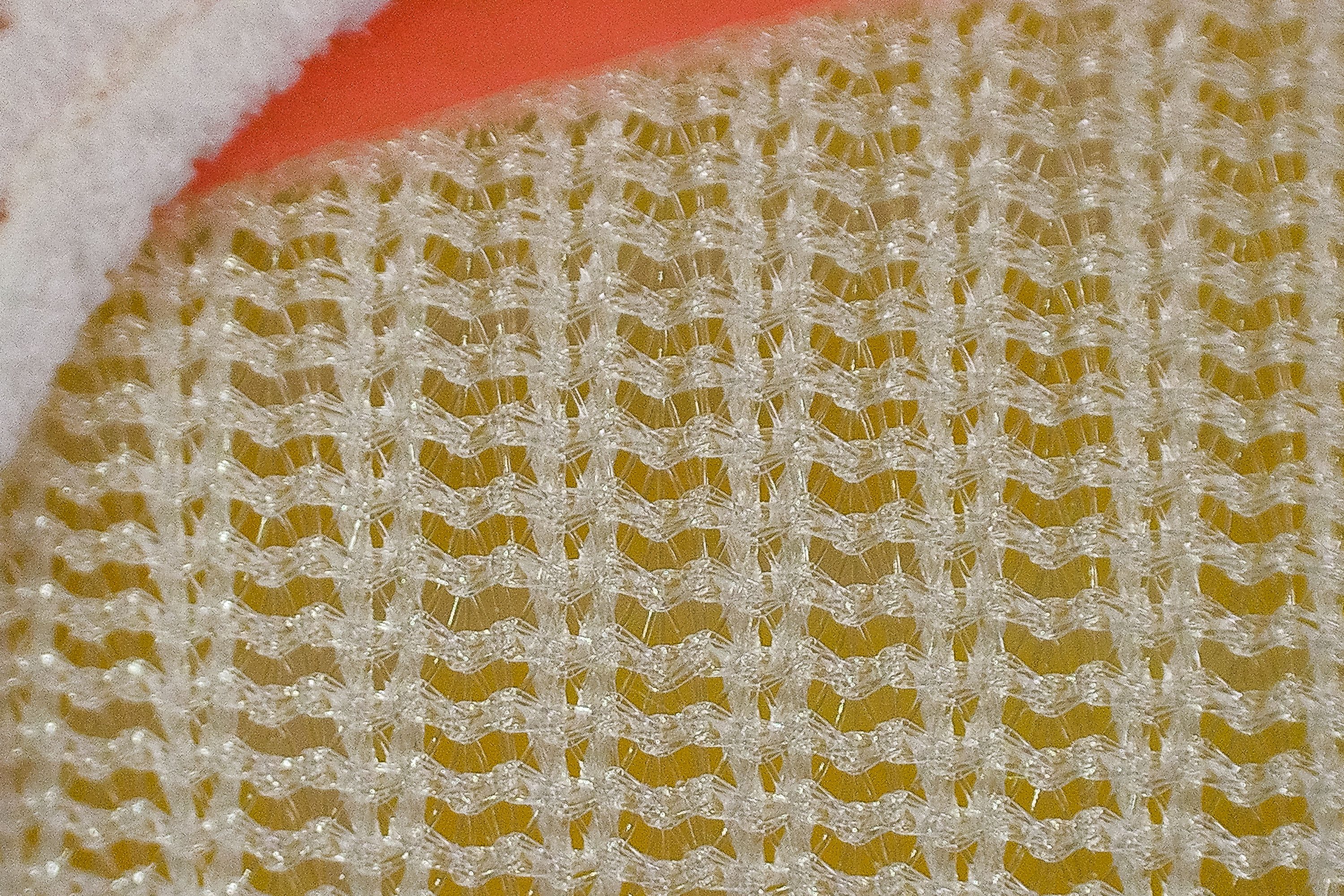
| Zoom Fly 5 | 2 |
| Average | 3.7 |
Stability
Lateral stability test
What's great about this Nike shoe is that it has enough stiffness to deliver a well-supported underfoot experience. Relatively supportive, of course, given its stack height and plate.
At least the shoe made us feel surefooted enough when cornering.
Torsional rigidity
We could feel how stiff the shoe was by merely twisting it in our hands. On a 1-5 scale where 5 is the stiffest, we gave its torsional rigidity a score of 4.
Having this bit of stiffness helps to prevent the ankles from rolling over the sole edges too easily.
| Zoom Fly 5 | 4 |
| Average | 3.5 |
Heel counter stiffness
The heel counter also plays an important part in making the shoe more supportive.
Testing its stiffness in the Nike Zoom Fly 5, we rated it as 3 out of 5 (5 being the stiffest). Stiffer heel counters are typically associated with a better foothold and a lower risk of ankle rolling. But on the downside, they can feel restricting to some runners. In that way, this Nike shoe hits a sweet spot.
| Zoom Fly 5 | 3 |
| Average | 2.9 |
Midsole width - forefoot
With the help of a calliper, we measured the sole at the forefoot and found that it is 111.5 mm wide, very close to the average. It's also wider and more flared out than the previous version, which was 106.7 mm.
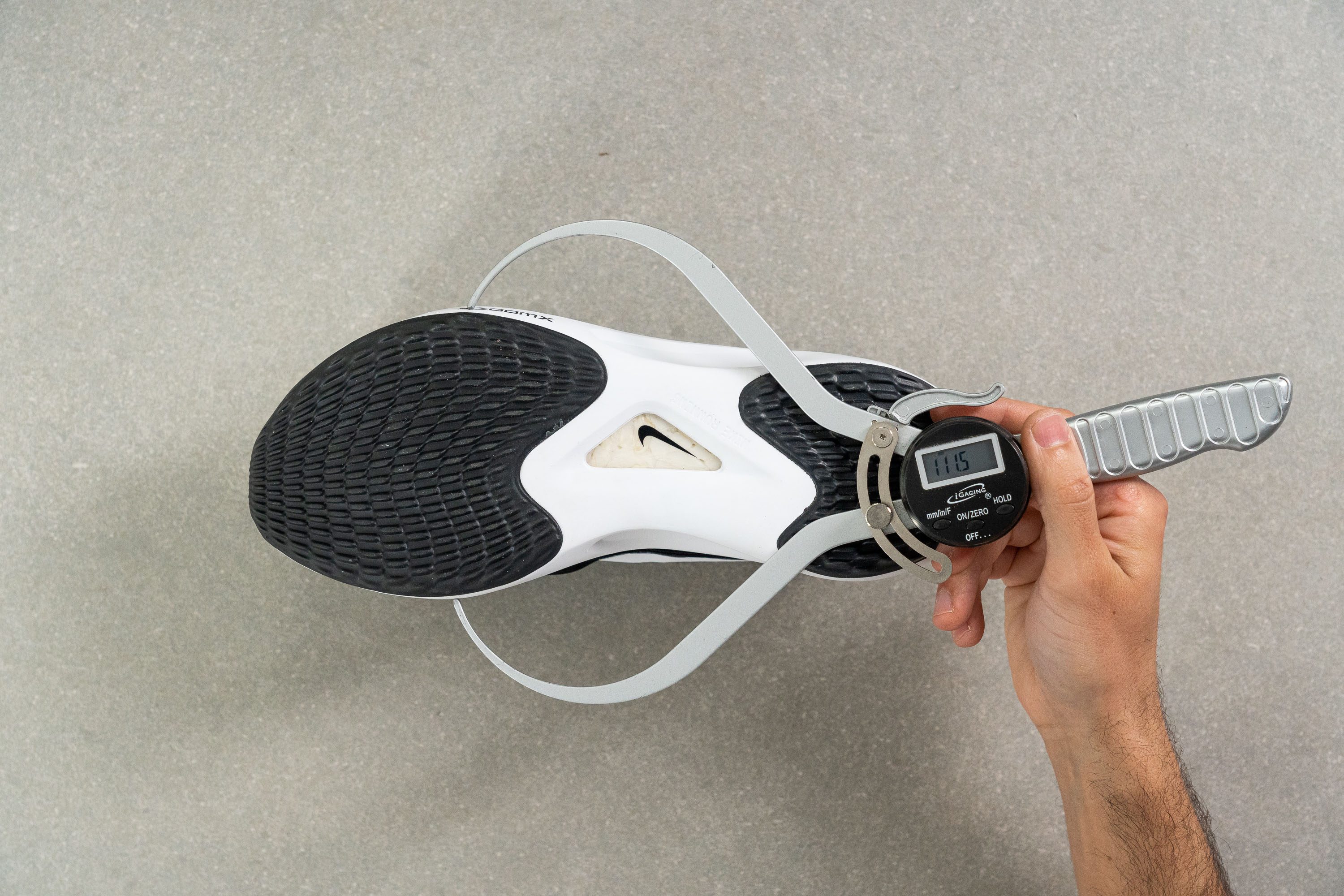
| Zoom Fly 5 | 111.5 mm |
| Average | 114.3 mm |
Midsole width - heel
At the heel, the shoe is almost 4 mm narrower than the average, yet it can still be considered mid-range.

Given that the sole is not very wide in the Zoom Fly 5, we can assume that the stability is provided mainly by the torsional rigidity of its platform.
| Zoom Fly 5 | 86.4 mm |
| Average | 90.7 mm |
Durability
Outsole hardness
We don't expect much from the outsoles on tempo trainers. This category of running shoes tends to sacrifice outsole durability for lighter weight and softer ride. And the Nike Zoom Fly 5 is no expectation.
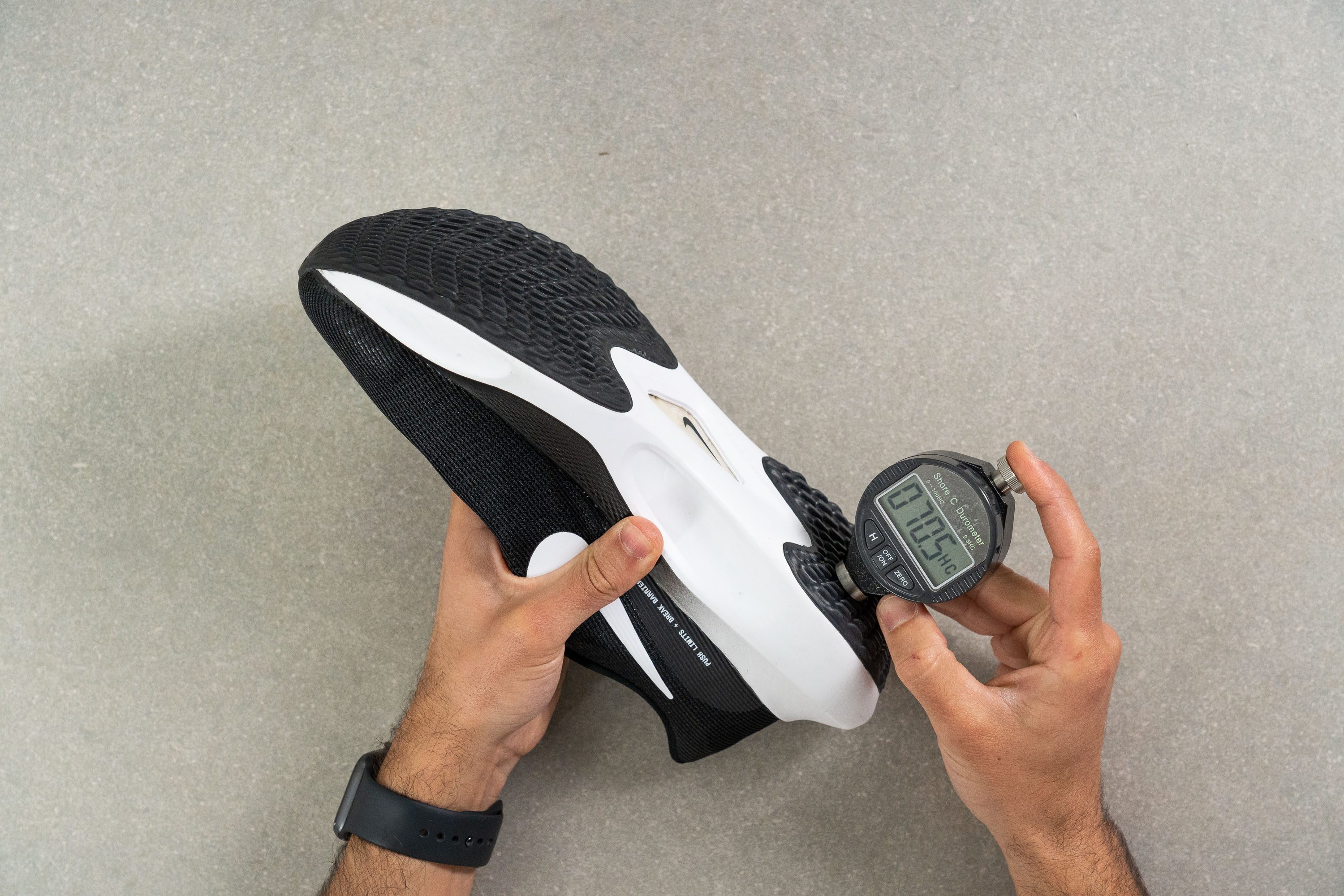
Using a durometer to check the firmness of its rubber, we found that it is in fact 14% softer than the average. Unfortunately, softer outsoles tend to wear out quicker than hard ones.
But on the bright side, this Nike shoe chose to cover a wider surface of the bottom for added protection in the high-wear areas. That looks promising to us!
| Zoom Fly 5 | 70.3 HC |
| Average | 79.2 HC |
Outsole thickness
The thickness of the outsole is another parameter that can tell whether it's durable or not. And this is where the Zoom Fly 5 truly surprised us.
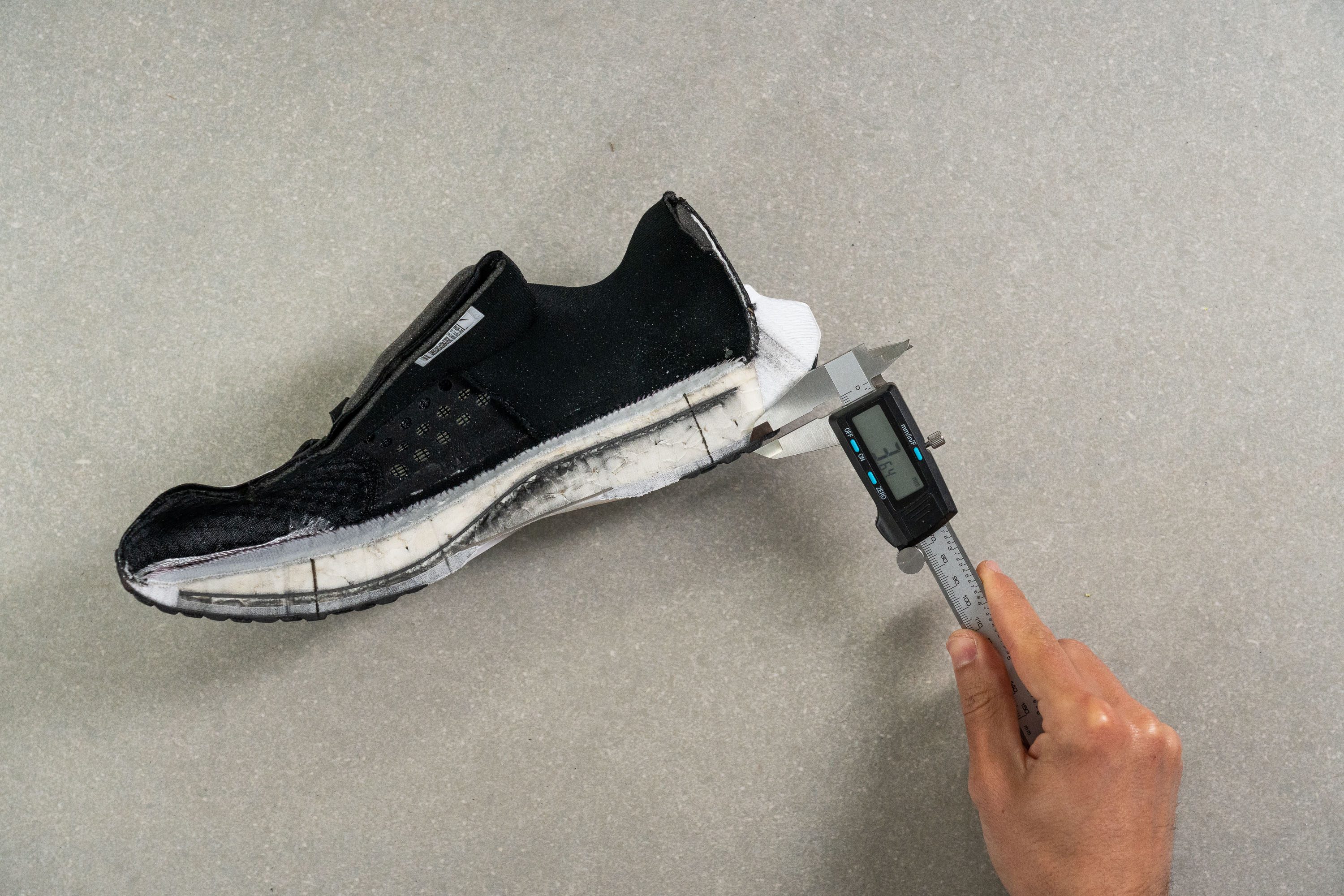
Our calliper showed 3.6 mm of rubber thickness! That's about 1-5-2 mm more than what's typical for a tempo shoe. From here on, we started to question whether this Nike shoe is really a tempo trainer or is it a daily workhorse after all?
| Zoom Fly 5 | 3.6 mm |
| Average | 3.2 mm |
Misc
Insole thickness
The shoe's insole has a thickness of 3 mm. It is actually thinner than most shoes we tested (4.5 mm on average) but we didn't have any problems with that.
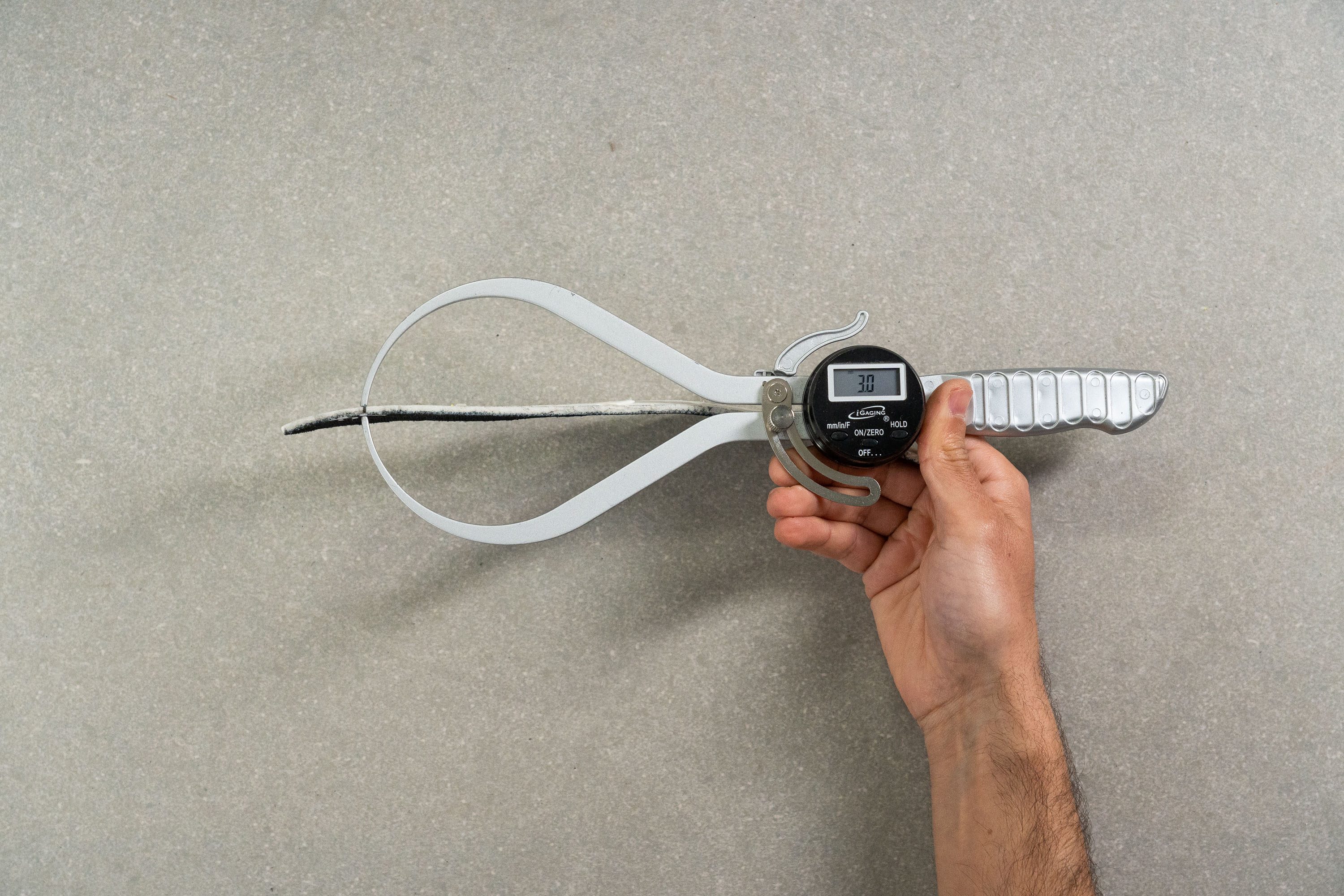
| Zoom Fly 5 | 3.0 mm |
| Average | 4.5 mm |
Midsole softness in cold (%)
What's more, even when the shoe is put into cold temperatures, its ZoomX foam retains its soft properties! We were shocked to see a durometer reading of 14.5 HA whereas most shoes firm up to 30 HA!
Even when frozen, the Nike Zoom Fly 5 is over 100% softer than most shoes!
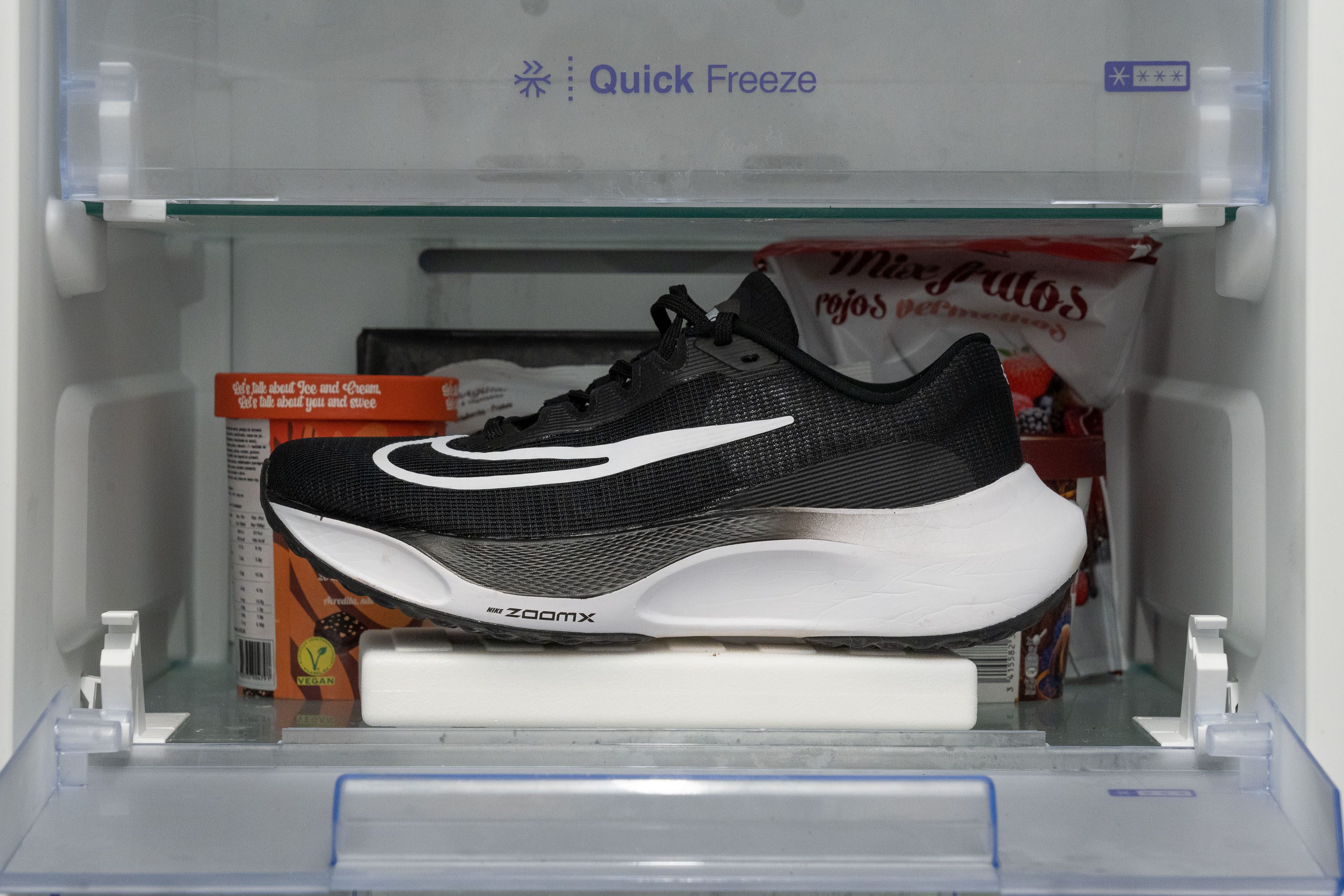
| Zoom Fly 5 | 32% |
| Average | 24% |
Tongue padding
We immediately noticed the shoe's amazing step-in feel courtesy of the well-padded upper. Its tongue is also very generously padded, which helps to prevent lace pressure beautifully.
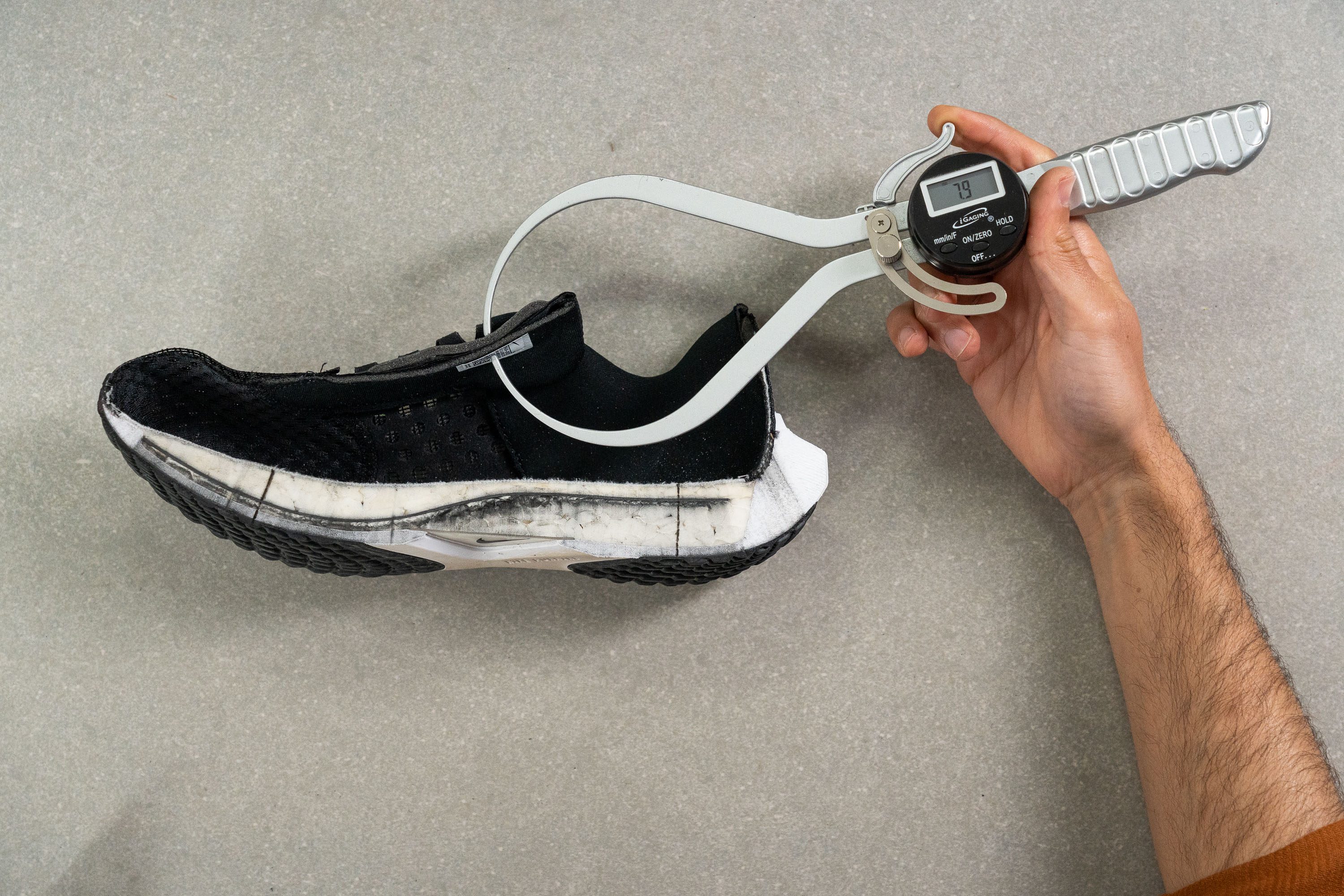
At 7.9 mm, the Nike Fly 5 has a noticeably thick tongue. For reference, the average of shoes that we tested is 5.6 mm.
| Zoom Fly 5 | 7.9 mm |
| Average | 5.8 mm |
Tongue: gusset type
The tongue is not gusseted on the Nike Zoom Fly 5 but it wasn't an issue given its generous padding.
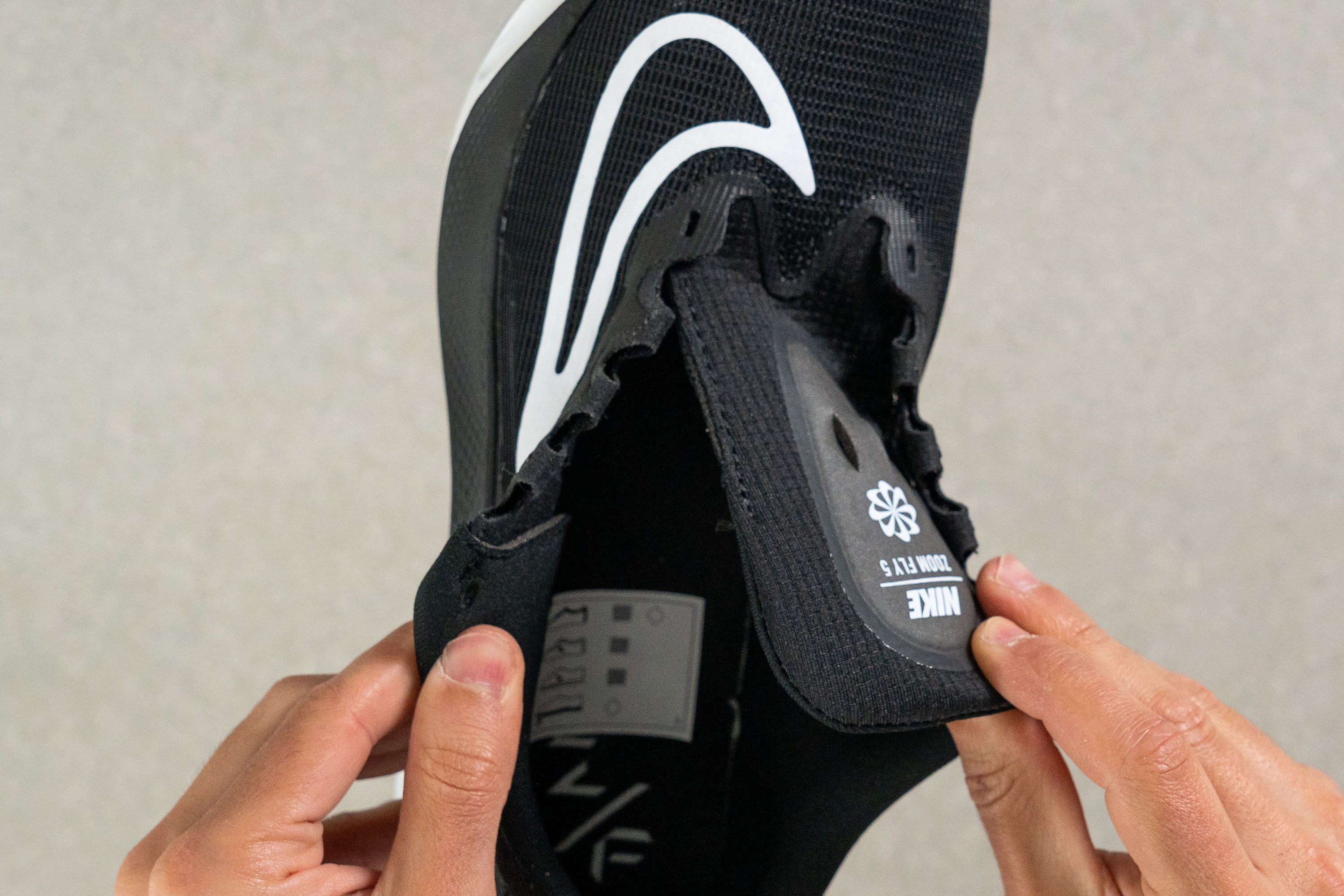
| Zoom Fly 5 | None |
Nike Zoom Fly 5 vs. 4
- It has a more flared-out heel and forefoot for better stability
- It integrates a ZoomX foam for a mellower ride
- It's gone from clunkier to clunkiest! The Nike Zoom Fly 4 was 249 grammes/8.8 ounces in US men's 9, which was already too much for some runners, while the Zoom Fly 5 now weighs in at 286g/10 ounces.
